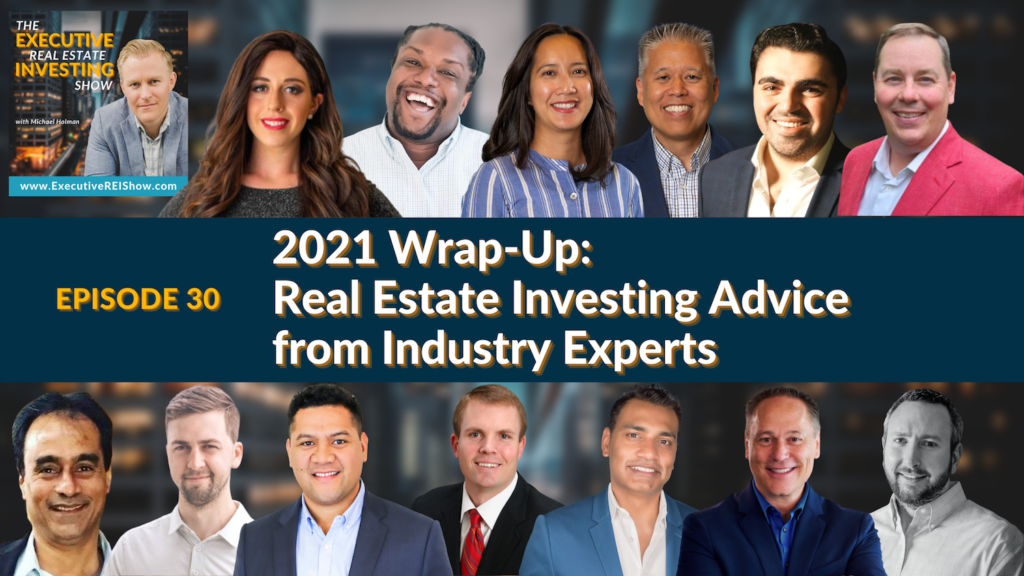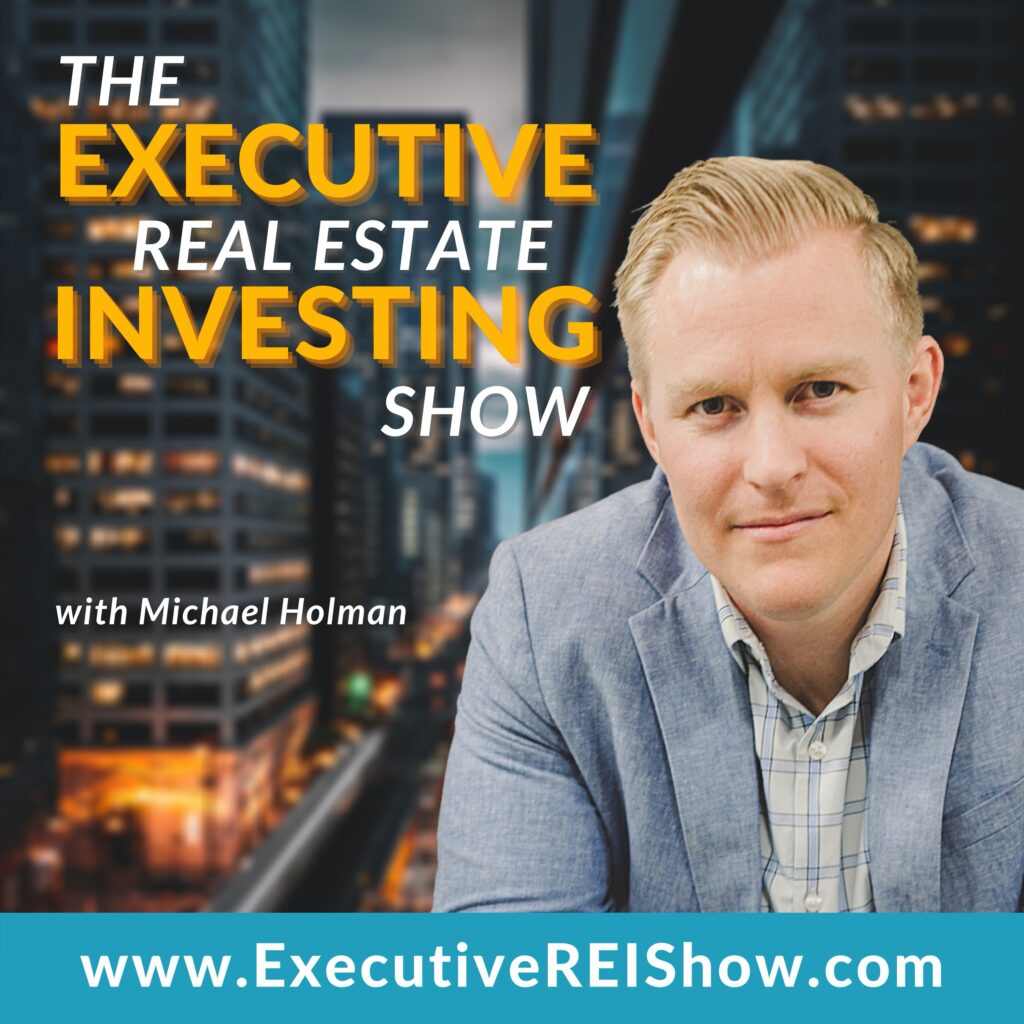
The executive Real estate investing Show
EPISODE 30
2021 Wrap-Up: Real Estate Investing Advice from Industry Experts with Michael Holman
- December 27, 2021
EPISODE SUMMARY
As we wrap up 2021, Michael looks back on the question he always asks at the end of every interview: “What is the best business advice you’ve ever been given?” While each guest has their own take, there are definitely some themes that emerge from their responses. You’ll hear Real Estate investors, brokers, agents, and many more weigh in on the importance of mentorship, weighing risks versus rewards, and most important: getting started.
Listen now as Michael presents the best of the best from 2021.
LISTEN TO THE PODCAST HERE

The Executive Real Estate Investing Show Podcast
EP 30: 2021 Wrap-Up: Real Estate Investing Advice from Industry Experts with Michael Holman
Listen on
READ THE TRANSCRIPT HERE
Note: Audio transcription has been automatically transcribed
Welcome to The Executive Real Estate Investing Show. This podcast is for you, the busy business owner or executive looking to create generational wealth. Here, we’re going to show you how to do that through real estate investing from multifamily to industrial and everything in between. You will become a real estate investing expert. And now, here’s your host, Michael Holman.
Michael Holman: Hello, everyone, and welcome to another episode of The Executive Real Estate Investing Show. As always, I’m your host, Michael Holman, and we have an awesome show for you today. I’m really excited to get started. This is kind of our year end extravaganza, over the course of 2021, we’ve brought onto the show a slew of Real Estate experts. Everyone, from sponsors to syndicators, to lending experts to coaches. The list goes on and on and on. All of them gave remarkable interviews about the ups and downs of Real Estate investing about their businesses and their lives. You all know, at the end of each show, I always asked our guests the same question, what is the best business advice you were ever given? Their answers always fascinate me. And today, I thought it would be fun to look back at those responses.
This is the best of the best when it comes to knowledge and think of the years of experience is wrapped up in these little nuggets of advice. But before we get started, I got to remind everybody, if you’re liking the show, if you’ve been listening to all these amazing people who’ve been coming onto the show, go ahead and subscribe, leave us a rating, leave us a review, we would love to hear from you, love to get your comments, love to see you give us a rating. We’d really appreciate that, that helps us get this show out. Also make sure you go to the website www.ExecutiveREIShow.com, you can sign up for the newsletter, you can ask Executive questions, you can see all the previous episodes and one of the coolest part about seeing all those previous episodes, you can go into the show notes.
All these amazing people we’ve been talking to and talking about, we get their contact information. We put it right there in the show notes. If you are like, hey, I just listened to so and so and he or she was just amazing. I have to go try and communicate with this person. Well, guess what? Right there in the show notes, they’ve given you the best way to contact them and communicate with them www.ExecutiveREIShow.com. Under the first set of clips, I want to see if you notice, a running theme that all these experts have hit on, take a look. What is the best business advice you were ever given?
Trevor McGregor: I could answer that so many different ways. But the best business advice I was ever given is find a coach or a mentor. That is the world is sped up so fast and if you’re trying to figure out everything on your own, you’re really fooling yourself because I can guarantee you, there’s somebody that has already done what it is you’re trying to do,
Jenny Gou: You can absolutely do what you plan to do yourself. Could I have done what I’ve done in the last year and acquired, almost 1600 doors in 18 months? Absolutely. Without a mentor though, without Steve, who was my first mentor in this business, it probably would have taken me twice as long. But having a mentor that has the same values, the same interests, as you do, will only help you accelerate that journey so much more. Find the right person to help guide you and add value to them not just be a time sucker in a dream but add strong value to them as well and that can only be a win situation. I found myself mentors, multiple mentors at P&G, and I found myself multiple mentors in Real Estate as well. So that was super important for me to accelerate this journey.
Steven Louie: You have a firm foundation around education, and you understand how Real Estate works and some of the details. Real Estate is wide open, there’s so many different angles that you can talk about. Really focusing and owning and what’s important. Whether it’s development, or whether it’s rehabbing an existing multifamily apartment. You focus on that niche, and it is completely different. If we had a conversation, we could talk about it, but I don’t know that much about development. Likewise, a lot of people don’t know that much about buying existing apartments, they think it’s impossible. So, I’d say create and surround yourself around the individuals that can help you. As Tony Robbins always says success leaves clues. You might as well serve yourself around those people that have done it before and educate yourself with some type of program, and it can get you to that next level.
Trevor McGregor: That could be a coach, a teacher, a mentor, a facilitator, a trainer, an accountability partner. But don’t go at it alone, find other like-minded people that elevate your emotions and lift you up and hopefully you lift them up as well, because of that old saying, a high tide lifts all boats.
Steven Louie: That ties back when I was a Sales Executive at MetLife and one of the things that one of my mentors mentioned to me is that nothing bad ever happens when you’re in front of your clients. Clients could be customers and that’s your brokers, that’s your lenders, and if you’re in front of them, and you’re top of mind, not annoying them, but you’re top of mind, great things are gonna happen and we definitely see that. I always think about that, every single time I’m out in marketing. Sometimes it’s draining, it is sometimes tiring, right. But always every time, whether it’s on Zoom, whether it’s on the phone, Jenny, and I can see great things happening every single time we have a conversation with somebody. So, I’d say take that time and build that relationship with people
Tj Lokboj: Don’t rush it, just get the right one. Don’t rush the partnerships. Every time, with my experience of investing in different things, like, for example, buying my small unit here in the valley, whenever there was a problem that went wrong, it was because someone didn’t do what they said they were going to do. Take time in developing those partnerships and get those right.
Esther Reizes-Lowenbein: I want to see what kind of person they are, that’s always how I start. If I’m ready to go to number two, then I do and I check out there, I want to see their track record, I want to see what they’ve done, I might ask a few people that they’re connected to about them, I want to hear what people have to say, because your past investors are the best referrals for you. They could be the best or the worst. I want to hear what people have to say about them, or what their track record is. Once I like that, then I’m going to check out the deal. For me, the sponsors most important and I want to see how transparent they are, and how much information they’re offering on the deal.
I had an opportunity that came to me, someone that acquired a property at an extremely low rates, he had gotten out of foreclosure. I’m talking about like $8 million below market value and I had presented the opportunity to many potential investors, whom I got on the phone with him. But not one person wanted to invest with him. Every single person wanted to buy the deal because it was a really good deal, but not one person wanted to go in with him. Because he wasn’t being transparent. He wasn’t providing the information. He’s like, just trust me. We’re like, no one’s trusting you. You have to provide the documents provide, all the information, show the numbers. If someone’s going in as a partner, you have to show them all the information. You can’t hide things. I did not deal with that anymore. He ended up losing the deal, it’s a different client of mine. But at the end of the day, the people that aren’t as transparent end up losing out in the long run.
Collin Dean: I think the best business advice would just be and it’s pretty common-sense stuff. Be honest with people, be where you’re supposed to be when you’re supposed to be there. There are so many folks that I’ve seen, just don’t do that, that doing the things that seem obvious and consistently doing them over time, over years and decades. It separates you, if folks can trust you, they respect you. I want people to trust me and to respect me and if I do what I say am going to do when I say I’m going to do it. I’ve just found that works very well. I think someone’s going to be successful if they do those things, aside from getting better, owning your craft increasing your knowledge, all those same basic stuffs. But if you take that and roll it into those things, I think people are going to be successful. It’s worked for me, and it has worked with folks that I know.
Esther Reizes- Lowebein: It wasn’t something that I was given. It’s something that I felt like that’s most important because whether it was on the residential end, if I was telling a client that there was mold in the house, I felt like people really appreciate the honesty I think people are so tired of being lied to. They just want to know what the truth is, and I feel like that has brought me a lot of repeat business. Because people see that I am as honest and trustworthy as possible. That’s what I aim to do.
Jordan Spencer: I have to relate an experience to answer this question. I was doing my time at Zions Bank many years ago. I worked at the head office and it’s this big building downtown Salt Lake, several floors of bank employees. I was meeting with a movie producer, who was also an actor with trained actors from Los Angeles, he was moving here to Utah, bringing his deposits, bringing his banking, he was interviewing banks, and I happened to be one of the guys that was in the room, brought him in with a banking executive, so it was my boss’s boss who wanted to be part of the meeting. That’s how big of a deal this was. It was basically the three of us in this conference room, designs Bank Tower and we’re sitting here talking to this movie producer trying to figure out what makes us tick, trying to understand what his needs are.
He looks at me and he says, hey, Jordan, what’s your favorite movie? And I said, that’s a good question. I got to go with a movie that I grew up watching, on VHS, literally every day. I mean, rewinding it, playing, rewinding, playing it. The original Superman, Christopher Reeve, Gene Hackman as Lex Luthor, who loves Real Estate. Go back and watch Superman, and you’ll see that Lex had it right. The money is in Real Estate. It was meant to be, that’s where this all started. But I said hey, I got to go back to my childhood. I loved the fact that I could watch that, and I truly believed that Christopher Reeve was Superman. I thought Superman was real. How cool it was for a little kid to think that you have this hero out there that saving people.
He looked at me and he said okay, just so I know, you’re not telling me something that’s not true. What was the tagline for that movie? And I’m like, kind of looking at him and I looked at the executive and I’m like, I certainly hope I don’t get in trouble for bringing up Superman in a bank meeting. I looked at the guy and I said, you will believe a man can fly. That was the tagline for the movie, and he looked at me with this, I thought he was gonna shoot lasers out of his eyes. But then he kind of loosened up. He reached across the table to shake my hand and he says you have one my business and I’m like, what? And the executive next to me is just staring at me like, this kid who likes Superman won your business. The guy looked at me he didn’t look at the executive. He said, Jordan, you are genuine, and he said, I train actors. I work with people who are actors all day long. You are not acting. He said, I can tell you are genuine, and you gave me a straight answer, you know what you’re talking about. He’s like, you were yourself. You just showed me that you can be yourself in a business situation. I kind of learned from that moment on, always be genuine, and be yourself. That is the best business advice I was ever given.
Michael Holman: Always be genuine and always be yourself. That was from Jordan Spencer. He’s not the only person to say be honest, be trustworthy, as Esther Reizes- Lowenbein said, be transparent. There’s no reason to be dishonest in this business or in life, and you can be successful in Real Estate by being real and being trustworthy. The other huge takeaway from this segment is find a mentor. Real Estate investing is hard and there’s a lot to it, so you can not go at it alone. Jenny said it perfectly when she said she could have achieved success on her own, but it would have taken twice as long. Finding her mentor and partner Steven changed the game for her, so find a mentor. This next set of clips definitely has a theme. Looking back on the interviews, I’m amazed that so many guests gave such similar answers. What’s the best business advice that you were ever given?
Raju Datla: Really persistence and pretty much that’s it, any business, anybody starts. If you’re not going to be persistent, it’s pointless, don’t even start because everybody knows business, you’re going to have that roller coaster ride and if you’re a person to quit easy, then nobody is going to succeed there. You might have a fluke and maybe succeed. But that’s not going to be a long-term success. Long term success is persistence and overcoming those odds.
Josh Ferrari: I don’t know if this is a cliche or not, but I would say just get started. I don’t know what that looks like for you and don’t listen to other people when they tell you, you have to do one specific thing and if you don’t, you’re gonna fail. It’s different for every person. I tried wholesaling and failed miserably. But I know a lot of people that make seven figures a year, running a wholesaling business, it’s not that wholesaling doesn’t work, it just didn’t work for me. So, figure out what works for you, and just get started. Don’t continuously think what could go wrong, think what could go right.
Jordan Spencer: Don’t be afraid of it. We tend to fear what we don’t understand, and a lot of the professionals that we deal with, sometimes it’s their first venture into Real Estate, they understand that they should do something, but they just don’t know where to start. The first thing I tell them is, don’t be afraid of failing. Don’t be afraid of investing in Real Estate. Let’s take a little bit of time, so you can understand a little bit more about the commitment that it takes to invest in Real Estate. However, just don’t be afraid of it. If you’re afraid, you’ll never take that first step. So, take the first step. That’s the key. There are so many great Real Estate professionals out there. We’re sitting on this podcast; Overland is a great source of helping you take that first step.
We talk with clients who are in that situation all the time, they think, I have a 401k, I have my life insurance policy, that’s a universal policy and it’s doing some cool things. But I know that I need to be doing something else. I see people investing in Real Estate, I don’t know how to do it and I’m also afraid because I don’t know what to do. Don’t be afraid, take the first step. There are lots of resources out there that can help you move into that first step.
Vikram Raya: I’ve seen this approach. Don’t take advice from someone who hasn’t been in where you want to go. I have had so many folks who try to tell me, oh, Real Estate is scary it doesn’t make sense, multi-family. You’re raising capital from people, what happens if you lose your money, I’m like, look, if you learn, get mentorship, do it the right way, figure out how to do it, minimize your mistakes, asymmetrical risk reward, you’re going to be fine. Because I didn’t listen to those folks, I am where I am today,
Scott Krone: I have a great mentor. My professor was the first mentor that I had. Then I had a second mentor who is quite accomplished in his life. He moved here from Lebanon at 16, with about $300 in his wallet, put himself through college. Now he owns a couple fortune 500 companies and is on the board of one of the largest banks in America and is the President of a University. One of the things that he always says is, look at the best case, worst case and what most likely will happen and if you can live with each of those situations, then go for it. But if you can’t live with your worst case, then don’t move forward with it. But also, if you get best case, then don’t try to re-trade it be happy with what you got. But always plan on what will most likely will happen.
Josh Ferrari: What’s the worst-case scenario if you don’t do it? Don’t think worst case scenario, if you do it like I’m going to lose a bunch of money. If you don’t do it, what’s the worst-case scenario?
Trevor McGregor: You can either be a spectator in sports, and that’s cool, or you could get on the field and play. I’m a big believer that the best time to buy Real Estate was yesterday and the second-best time is today. You don’t have to know it all. You don’t have to wear every hat, but what you do need to do is decide, do you want to go at it actively or do you want to go in and passively and oftentimes different strokes for different folks. The passive investing is enough to whet your appetite to then keep going down that passive path or at some point branch out into and take intelligent inspired action, actively as well. The number one thing I’d say is don’t sit on the sidelines, get in the game.
Raju Datla: Number one thing is, invest in Real Estate. If you don’t have time do the passive investing. But if you don’t, especially where the dollar value might be going, you better have assets. Anybody will probably say that I don’t have to say that. Anybody who has any business sense where the economy is probably going to head. Invest in business look into it, if you can’t do active just do passive, there are plenty of avenues. There are so many options, cash flow or multiplier, there’s so many things. Look seriously into that.
Collin Dean: Advice would be do as much due diligence as you can on things without having analysis by paralysis. You got to do as much due diligence as you can, don’t be paralyzed by it, and move forward and realize you’re gonna learn as you go. One other thing that I’ve learned along the way is, and this is investment advice. I always thought 401k, that, I’m going to invest, I’m gonna have the 4% rule, I’m going to have $5 million and live. But the thing I never thought of, and it came to fruition, when you’re going to lose a job, or things get moved, your cheese gets moved on. And you’re like, okay, I’ve got all this money in my 401k, which is great. But I’m 35 years old or how old I was at the time, and I can’t access that money, I can’t do anything with it, even my $2 million at that point.
There’s nothing I can do with it. At that point, I’m still gonna do my 6% company match, do all that. But I’m going to start getting cash now and taking that money that I was investing there and have money that I have access to immediately. If I lose my job in two years, I’ve got side investments that are starting to make this passive income and other little streams of income and not just one lump sum that I’m waiting on that I can’t really access until I’m 65, or 67 and a half, or whatever it is. That was enlightening to me when that happened 8,10 years ago, whatever it was seven years ago.
Michael Holman: Jerome what is the best business advice you were ever given?
Jerome Myers: Figure out Digital Marketing.
Michael Holman: I love it and why do you say that?
Jerome Myers: If you didn’t figure it out before COVID you had no business. The reach that the internet gives people is second to none. I’ve literally changed my entire network, through LinkedIn, and the people that I’ve met there. Simply by using content-based marketing, and thought leadership, I’ve been able to create a community of people who have changed. Me knowing one millionaire, when I got into the business to the majority of people, I talked to having seven, eight and nine figure networks.
Michael Holman: The last clip was Jerome Myers demonstrating the type of Moxie, you need to be successful in Real Estate. When COVID-19 happened, Jerome used his media marketing savvy to build his investor base, he was persistent, and it paid off. Jerome and all these guests took their time to get educated, found mentors, did all of that and then they got started. They didn’t let analysis paralysis take hold. Real Estate investing has its risks, and these people weighed those risks and rewards, it worked out for them and if you do your homework, it can work out for you too. But there’s always a but right, what happens when it doesn’t work out? What is the best business advice you were ever given?
Johnathan Livi: Appreciate failure a lot. Just live in the failure, let it wash over you and just feel it helping you grow. I think learning to live with failure and learning to have that growth mindset from failure, I think is the greatest thing you’re going to do for yourself. Because there’s something I have on my wall. It says when nothing seems to help. I go and I looked at a stone cutter hammering away at his rock. Drops 100 times about as much as the crack showing in it. At the 100 and first blow. It’ll split in two and I know it was not that last blow that did, it is all that had gone before. It’s all those failures before helping, like a certain level of success. When the success comes it will come. But if you don’t have the ability to, the thick skin to withstand a certain amount of failure before you get there, it’s not going to come together now.
Scott Krone: Keep your options open. Make sure that you’re constantly reviewing your data and adjusting quickly. Don’t sit back and wait and adjust quickly.
Jenny Gou: You know what maybe some of your listeners do love their current jobs, do enjoy what they’re doing and that is awesome. But what if you could plan for generational wealth? for your kids and their kids or grandkids, what if you could offset some of those taxes that you’ve worked so hard to, your income you worked so hard to generate. Find your why and then get clear on how you get there and if it’s Real Estate like we are doing, just make it happen, take that first step and then it’ll just snowball after that.
Jerome Myers: You don’t have to get Moby Dick on your first fishing expedition. It’s very okay to get some tuna in the boat. Come back to shore lay it out so everybody sees that you did it and your tuna is making money. You lay out, let people know what your returns were and if people see that they want to go out with you the next time and so maybe you got a bigger boat, more people. Maybe you get some Sword fish the next time you come back, and then maybe you do some Shark hunting and then maybe you do the Whale hunting, but this whole concept that you just need to go get Moby Dick the first go around I think is hogwash.
Tj Lokboj: Your future is as bright as your faith. Just have faith in yourself, have faith in your team and persevere, continue to work at it and trust the process and all things will work out if you work hard and do those things. It’s not difficult. We’re here as stewards and adding value and serving people. Your future is as bright as your faith brother.
Michael Holman: Your future is as bright as your faith brother, Tj Lokboj bringing it home for us. Jerome Meyer says, you don’t have to get Moby Dick on your first fishing expedition. Jenny says find your why and then get clear on how to get there. Jonathan Livi, appreciate failure a lot. Again, they are all saying kind of the same thing. Be patient, ready to learn when things don’t work out, manage expectations, and have faith in the process and in yourself most importantly. Real Estate has risks and success is not guaranteed. But if you’re watching this show, then you might be the type of person that sees the potential rewards in Real Estate investing and that’s why I’m here.
I want to help you learn as much as you can about Real Estate investing by interviewing people who have done it and done it. I want to thank all of you for tuning in, for subscribing to the newsletter and for submitting questions on the website, www.ExecutiveREIShow.com. 2021 was a year of big changes for so many of us and a lot of ups and downs. Here hoping that 2022 will be even better for everyone. Thanks for watching. See you next time.
Thank you for listening to The Executive Real Estate Investing Show. Ready to learn more? Go to ExecutiveREIShow.com for more episodes and resources to help you create generational wealth through real estate investing. That’s ExecutiveREIShow.com.
WATCH THE EPISODE HERE
MENTIONED IN THE SHOW
- Connect with Real Estate Experts
- Jordan Spencer
- Collin Dean
- Esther Reizes-Lownbein
- Raju Datla
- Josh Ferrari
- Vikram Raya
- Trevor McGregor
- Jerome Myers
- Jonathan Livi
- Tj Lokboj
- Jenny Gou & Steven Louie
- Scott Krone
EPISODE ARTICLE

Jump in to Real Estate Investing: Advice from Experts on How to Succeed
It’s hard to believe that 2021 is coming to a close in just a few days. We’ve had an amazing year here on The Executive REI Show talking about building generational wealth through real estate investing. We’ve had a huge range of industry experts as guests on the show, bringing their years of experience and wisdom to help show us the way. Guests have ranged from coaches to sponsors to influencers to business owners—each with
EPISODE NOTES
Michael Presents The Best of the Best 2021
- In our first series of clips, we hear from RE investors Trevor McGregor, Jenny Gou and Steven Louie. They all hit on the importance of finding a mentor.
- Trevor: “If you’re trying to figure everything out on your own, you’re really fooling yourself, because I guarantee there’s somebody out there who’s already done what it is you’re trying to do.”
- Jenny Gou: “Could I have done in the last year and acquired almost 1600 new doors in 18 months? Absolutely.” But Gou says that find her mentor Steven Louie “was super important to accelerate this journey.”
- Steven echoes that thought and stresses the importance of building relationships. “As Tony Robbins says, ‘success leaves clues,’ so you might as well surround yourself with those who have done it before, and educate yourself with some type of program.”
- McGregor: “[a mentor could be] a coach, a teacher, a mentor, a facilitator, a trainer and accountability partner, but don’t go it alone. Find other like-minded people that elevate your emotions and lift you up. And hopefully you lift them up as well. Because of that old saying, you know, a high tide lifts, all boats.”
- Tj Lockboj of Syndication Pro says to not rush relationships and to find the partnership. “whenever there was a problem that went wrong, it was because someone didn’t do what they said they were going to do. So take time in developing those partnerships and get those right.”
- Esther Reizes-Lowenbein of eXp Realty emphasizes transparency. “I want to see how transparent they are and how much information they’re offering on the deal…You know, you have to provide the documents, provide all the info, show the numbers. If someone’s going in as a partner, you have to show them, all the information. You can’t hide things. At the end of the day, there’s people that aren’t as transparent, end up losing you in the long run, they don’t have repeat investors.”
- Collin Dean: “I want people to trust me and to respect me, and if I do what I’m going to do when I say I’m going to do it, I’ve just found that that works very well, and I think someone’s going to be successful if they do those things.”
- Jordan Spencer of Red Canyon Financial recounts a story involving a Hollywood producer who was meeting with Jordan to see if his company could get the producer’s business. The producer asked Jordan what his favorite movie of all time was. ““Ah, that’s a good question. I’ve got to go with a movie that I grew up watching like on VHS, literally every day. I mean, rewinding it, playing it. Rewinding it, playing it. The original Superman. Christopher Reeve.” The producer tested Jordan to see if he was telling the truth by asking “’Okay. Just so I know you’re not telling me something that’s not true. What was the tagline for that movie?’” Without hesitating, Jordan responded “’You will believe a man can fly.’” That was the tagline for the movie, and he looked at me with this, just like I thought he was going to shoot lasers out of his eyes, but then he kind of loosened up. He reached across the table to shake my hand and he says, “You have won my business.” Why? Because Jordan was himself. “He said, ‘I can tell you are genuine, and you gave me a straight answer and you know what you’re talking about.’”
- RE Investor Raju Datla says that persistence is a key factor to his success. “If you’re not going to be persistent, it’s pointless. Don’t even start because anybody who knows business knows you’re going to have that rollercoaster ride. And if you’re a person to quit easy, then you’re never going to succeed.”
- Another RE Investor, Josh Ferrari (Ferrari Capital), hits the nail on the head with this advice: “Just get started…. Don’t just continuously think what could go wrong. Think what could go, right? Or what is the what’s the worst-case scenario? If you don’t do it, don’t think worst case scenario. If you, do it, like ‘I’m going to lose a bunch of money.’ If you don’t do it, what’s the worst-case scenario.”
- “Don’t be afraid of it,” says Jordan Spencer of Red Canyon Financial. “Don’t be afraid of failing, and don’t be afraid of investing in real estate. Let’s take a little bit of time so you can understand a little bit more about the commitment that it takes to invest in real estate. However, just don’t be afraid of it. If you’re afraid, you’ll never take that first step. Take the first step. That’s the key.”
- Vikram Raya, a medical doctor who is transitioning full-time into the world of multi-family syndication, feels relieved for not taking advice of naysayers. “Don’t take advice for someone who hasn’t been where you want to go. I have had so many folks who try to tell me, ‘oh, real estate is scary. It doesn’t make sense. Multifamily. What happens if you lose our money?’ If, you learn, get mentorship, do it the right way, figure out how to do it. Minimize your mistakes, you’re going to be fine. And because I didn’t listen to those folks, I am where I am today.”
- Scott Krone (Coda Management Group) is an architect who has moved out of multifamily to concentrate on self-storage. His advice is similar to Raya’s. “. Look at best case/worst case and what most likely will happen. And if you can live with each of those situations, then go for it.”
- Raju Datla adds that if you don’t have the time to jump into syndication, you could at least do passive investing.
- Collin Dean warns against “analysis paralysis.” “Move forward and realize you’re going to learn as you go.”
- For Jerome Myers (Myers Development Group), his advice is to learn digital marketing. It was a smart move for Myers. His media savvy has increased his investor base. “If you didn’t figure it out before COVID, you had no business. And the reach that the internet gives people is second to none.”
- All this talk of jumping into the real estate investing game makes it seems like a no-lose strategy. But of course, that isn’t always the case. It’s a risky business. What happens when you fail? Jonathan Livi (Buckingham Advisors) says to embrace failure. “Let it wash over you and just feel it helping you grow. I think learning to live with failure, learning to have that growth mindset from failure, I think is the greatest thing you’re going to do for yourself.”
- Myers uses a metaphor from classic literature: “You don’t have to get Moby Dick on your first fishing expedition. It’s very okay. To get some tuna in the boat, come back to shore, lay it out so everybody sees. You did it and your tuna is making money, right? So you lay it out, let people know what your returns were. And if people see that they want to go out with you the next time.”







